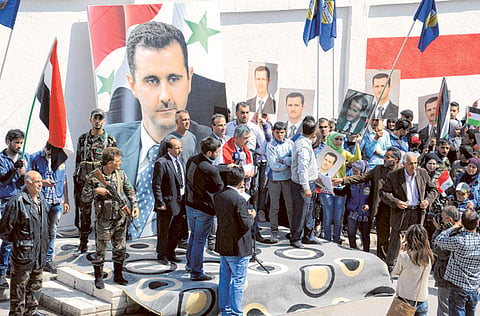Israelis bomb Syria after Golan attack
Occupation blames Al Assad regime for the attack on its soldiers

Occupied Jerusalem: The Israeli regime launched air raids against Syrian army positions early Wednesday and issued a warning to Damascus just hours after a bomb on the occupied Golan Heights wounded four of its soldiers.
The air strikes marked the most serious escalation along the ceasefire line with Syria since the 1973 Middle East War, with the Israeli defence minister warning that Damascus would pay a “high price” for helping militants bent on harming his regime.
Its Prime Minister Benjamin Netanyahu had on Tuesday warned that the Israelis would act “forcefully” to defend themselves following the Golan attack.
The Golan Heights is Syrian territory that was occupied by the Israelis in 1967.
“The IDF targeted several Syrian army positions which aided and abetted the attack against IDF personnel yesterday,” a military statement said, with a spokeswoman confirming the occupation’s air force had staged bombing raids on the Syrian side of the Golan Heights plateau.
The air raids targeted a Syrian army training facility, a military headquarters and artillery batteries, the statement said.
Military sources confirmed that the air force had carried out four strikes at around 3:00am (0100 GMT).
There was no immediate response from the Syrian military, the spokeswoman said.
The air raids took place 12 hours after four soldiers who were patrolling the Israeli side of the ceasefire line were wounded by a roadside bomb, one of them severely.
Two previous attempts to strike soldiers along territory the Israelis control on March 5 and March 14 were blamed on Hezbollah, Lebanon’s powerful Shiite movement which fought a bloody war with the Israelis in 2006.
In a statement issued at dawn, Defence Minister Moshe Yaalon said the Israelis held the regime of Syrian President Bashar Al Assad accountable for the attack.
“We see the Assad regime as responsible for what is happening under its authority, and if it continues to cooperate with terror elements who seek to harm Israel, we will make it pay a high price,” Yaalon said.
Militants from Hezbollah are fighting alongside Syrian troops in their three-year battle against rebels bent on overthrowing Al Assad.
The Israelis would not tolerate any “breach” of their “sovereignty” and would continue to strike anyone seeking to harm their forces or civilians, Yaalon said.
“We will react with determination and force against anyone operating against us, at any time and any place, as we have done tonight,” he said.
“Whoever tries to harm us takes his fate in his hands.”
Israeli officials have been careful not to directly blame Hezbollah at this stage, but Netanyahu on Tuesday said there was a growing number of “jihadists and Hezbollah elements” on the Syrian Golan, saying it “represents a new threat” for the Israelis.
Although there was no immediate claim of responsibility for Tuesday’s bomb, analysts pointed to similarities with an explosion last week targeting troops along the Lebanese border, which was blamed on Hezbollah, and a similar attempt in the Golan on March 5.
In Friday’s incident, an explosion targeted Israeli troops on the Lebanese border, very close to Syria, prompting the military to shell Hezbollah positions over the border.
And on March 5, the Israeli army said troops on the Golan had opened fire on Hezbollah members as they tried to plant a bomb near the ceasefire line.
It claimed to have struck the two fighters but did not say what weapon it used or whether they died.
The Israelis occupied the strategic Golan Heights plateau in the 1967 Middle East war and annexed it in 1981 in a move never recognised by the international community.
Analysts linked the escalation in border tensions to a February 24 air strike which targeted a Hezbollah position in Lebanon, close to the Syrian border, which the Shiite group blamed on the Israelis.
If confirmed, it would be the first Israeli attack against Hezbollah inside Lebanon since their 2006 war, which killed more than 1,200 people in Lebanon, mostly civilians, and some 160 Israelis, mostly soldiers.
Hezbollah has vowed to respond to the air strike.
Sign up for the Daily Briefing
Get the latest news and updates straight to your inbox



